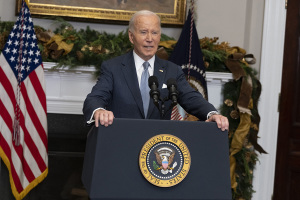What’s difference between education and propaganda?

Propaganda and conspiracy theories are often troubling and all too common. They also present serious challenges to critical thinking. There is also increasing attention and debate given to whether public schools and colleges in our time educate or indoctrinate their students. What’s the difference between education and propaganda? One of the best ways of avoiding propaganda is knowing what it is and how it functions differently from a classical liberal education. First, it’s necessary to define three key terms.
Education is the pursuit and discovery of information, knowledge, truth, and wisdom (and the skills to do so) through critical analysis. That challenging process of discovery can be unaided (self-study) or aided (teachers). The prized goal of education is for the student to develop the ability to form an independent, reasonable judgment of the topics studied. Thus, the goal of the tutelage is to equip the student to think both analytically and independently.
A modern or classical liberal education prioritizes competency development over knowledge accumulation and general education over specialized education. Learning to learn, and self-directed, life-long learning are also key concepts. The goal is to guide students to become critical-thinking adults with civil competency. Tools for achieving these goals include academic freedom, practice and experience, effort, political neutrality, and interaction and Socratic dialogue.1
Indoctrination can refer to mere instruction on a topic. To some extent, education involves a level of indoctrination. However, indoctrination often carries the negative meaning of inculcating ideas in an uncritical manner. It often lacks the necessary critical analysis; as such, it undercuts the goals of modern liberal education. Indoctrination then to some degree is closer to propaganda than to education.
Propaganda involves the spreading of information — including slanted and deceptive information — to get someone to accept a particular agenda, usually of a political nature. Propaganda is then worse than well-intentioned indoctrination because it seeks to control a person and maneuver them into adopting a specific ideology or viewpoint.
Intellectual historian and political philosopher Richard M. Weaver contrasts education with propaganda:
It is of primary importance to distinguish propaganda from education. These two are confused in the minds of many people because both are concerned with communication. Education imparts information and also seeks to inculcate attitudes. Propaganda frequently contains information, and it is always interested in affecting attitudes. A good part of modern propaganda, furthermore, tries to parade as education. The critical difference appears only when one considers the object of each.2
The lack of freedom of speech on American university campuses and thus the legitimate concern of encroaching propaganda in education has intensified over the last quarter century. The University of Chicago in response to this growing concern developed guiding principles to attempt to secure academic freedom and return to a classical liberal education standard. This article explains:
The Chicago principles, also known as the Chicago Statement, are a set of guiding principles intended to demonstrate a commitment to freedom of speech and freedom of expression on college campuses in the United States. Initially adopted by the University of Chicago following a report issued by a designate Committee on Freedom of Expression in 2014, they came to be known as the ‘Chicago Statement’ or ‘Chicago principles’ as the Foundation for Individual Rights in Education (FIRE) led a campaign to encourage other universities across the country to sign up to the principles or model their own based on similar goals ... As of April 2022, FIRE reported that 84 U.S. colleges and universities had ‘adopted or endorsed the Chicago Statement or a substantially similar statement.’”3
In this article, we quote affirmatively from statements made about education and freedom of speech and expression from the University of Chicago.
Let’s now look at seven specific ways true education differs from propaganda.
Seven ways education differs from propaganda
A classical liberal education (analytical discovery) strives to incorporate the following seven ideals, practices, and virtues, whereas propaganda (manipulative persuasion) in turn denies, ignores, or limits them.
1. Education emphasizes how to think instead of what to think
Genuine learning requires developing critical thinking skills that can aid the student in analysis and evaluation in order to form a reasonable judgment on a given topic. A good education prepares students to develop the necessary skills to learn to think for themselves. Logic is a discipline of careful thinking.
Propaganda tells a person exactly what to think, even specifically what conclusion to draw from an argument. Propaganda is interested not in developing rational judgment in the mind of the student but in the pure persuasion of the student’s mind toward its specified ends. It prescribes what the propagandist wants you to think, while discouraging what you think.
2. Education pursues objectivity instead of subjectivity
A solid approach to learning acknowledges the challenge of human bias and prejudice and seeks to promote reasonable open-mindedness, evenhandedness, and basic fairness when considering issues. Education usually serves to broaden one’s perspective and to seek the objective if it can indeed be found.
Propaganda appeals to human bias and prejudice if it serves its purpose. Rather than an open, even-handed, and fair mind, propaganda wants a mind that is fully subjected to its aims. Propaganda is agenda-driven. It focuses on the subjective goal of persuasion and significantly narrows one’s perspective of the issues.
Weaver, again, contrasts education with propaganda:
The true educator is endeavoring to shape his audience for the audience’s own good according to the fullest enlightenment available. In doing so he erects and strives to follow a standard of objective truth. The propagandist, on the contrary, is trying to shape his audience according to the propagandist’s interest, whether that be economic, political, social, or personal.4
3. Education introduces disagreements, instead of shielding them
Discovering genuine knowledge and truth about life and the world is seldom without controversy and disagreement among people. A good learning environment exposes students to the general and important differences concerning topics and perspectives. Education presupposes an intellectual free market of ideas. Even if the school has a particular worldview focus (religious or secular), alternative views are presented accurately and thoughtful discussion and comparison are given. People who hold opposing views are even invited to campus for dialogue and debate.
Propaganda selectively shields people from controversies and disagreements. It doesn’t want its ideas to be openly inspected and challenged. There’s no free market of ideas debate. People who hold opposing views are shouted down or not given a place at the table of discussion, while free speech and open debate are constrained in favor of ideological safe spaces.
In contrast, the University of Chicago, a beacon for free speech and a free market of ideas, describes its approach to education:
We teach students how to think, not what to think, in an independent, flexible, and creative way. We foster a skeptical approach and a demand for data balanced by optimistic belief that the greatest challenges provide the richest rewards.5
4. Education examines both sides instead of just one side
When topics are divided between viable positions, a good model of education exposes students to a fair-minded discussion of both sides of a controversial issue. The perspective of a classical liberal education is to expose students to differing positions and arguments and let the student develop the capacity to form an independent judgment on the matter.
Propaganda tends to be manipulatively one-sided in perspective because it has a lot to lose by allowing both sides to be compared and contrasted. Propaganda’s goal is to win acceptance and protect its perspective at nearly any cost.
In 2014, the University of Chicago appointed a Committee on Freedom of Expression to evaluate and express the institution’s responsibilities toward its students. The committee concluded that a conflict of ideas is inevitable, even natural and that it is not the school’s place to help students avoid such conflicts:
But it is not the proper role of the University to attempt to shield individuals from ideas and opinions they find unwelcome, disagreeable, or even deeply offensive ... concerns about civility and mutual respect can never be used as a justification for closing off discussion of ideas.6
5. Education reviews both pros and cons
Proposed solutions to problems can be controversial and usually involve potential strengths and weaknesses. A fair-minded approach to learning gets into the practice of examining both the pros and cons of a position. Genuine learning involves knowing a viewpoint’s strengths and weaknesses.
Such knowledge is a serious threat to propaganda. If people examine the pros and cons, then they may begin to think for themselves and take differing positions. Propaganda is all about persuasion; thus, the focus is exclusively on either the strengths or the weaknesses, the pro or the con, depending on how it relates to the agenda.
A fair-minded approach to learning examines both the pros and cons of a position. The University of Chicago argues that they have a “solemn responsibility not only to promote a lively and fearless freedom of debate and deliberation but also to protect that freedom when others attempt to restrict it.”7
6. Education promotes honest intellectual inquiry, not deception
A proper education stresses the critical importance of honesty at every stage of the learning process. Because ideas, evidence, and arguments are prized, they should be treated with integrity. Reality and truth can’t be separated from moral virtue.
Unfortunately, manipulation and intellectual deception are the hallmarks of propaganda. Persuasion means winning — and, for propaganda, if winning comes at the cost of truth, honesty, and rationality, then so be it. Intellectual honesty is always the casualty of propaganda.
Richard M. Weaver maintains that propaganda often employs four informal logical fallacies that manipulate thinking:8 ad hominem (character attacks), false cause (confusing cause-effect relationships), weak analogy (faulty analogies), and unqualified authority (inappropriate appeals to authority).
7. Education encourages dialogue over monologue
Respectful discussion, dialogue, and interaction enhance learning. In fact, learning under multiple voices is often superior to learning under one especially authoritarian voice. Propaganda, on the other hand, permits no other voices to be heard. It is a monologue where other voices are drowned out intentionally, lest they challenge the agenda. Christian theologian Tim Keller illustrates the benefits of dialogue this way:
When you listen to and read one thinker, you become a clone; Two different thinkers, you become confused; Ten thinkers, you’ll begin developing your own voice; Two or three hundred thinkers, you become wise.9
A good education (unaided or aided) can provide the critical tools to help students gain genuine knowledge, truth, and wisdom.
Robert M. Hutchins, former president of the University of Chicago, who along with Mortimer J. Adler introduced the university to the study of the great books, believes student discussion should not be restricted. He insisted that the “cure” for ideas we oppose “lies through open discussion rather than through inhibition.”10 Hutchins also added that “free inquiry is indispensable to the good life, that universities exist for the sake of such inquiry … without it they cease to be universities.”11
A noble learning experience illuminates the human condition and greatly enhances the human experience in life and in the world. A genuine education would, by its very nature, be the solution to the deep problem of propaganda. Which of education’s seven ideals, practices, and virtues do you find the noblest? How prevalent is propaganda today? How would your education experience stack up?
Notes
1. Vitaly Kurennoy, “Philosophy of Liberal Education: The Principles,” IDEAS, ideas.repec.org/a/nos/voprob/2020i1p8-39.html.
2. Richard M. Weaver, In Defense of Tradition: Collected Shorter Writings of Richard M. Weaver, 1929–1963, illustrated ed. (Carmel, IN: Liberty Fund, 2001), 300.
3. Wikipedia, s.v. “Chicago principles,” last modified January 7, 2024, 15:50 (UTC), en.wikipedia.org/wiki/Chicago_principles.
4. Weaver, In Defense of Tradition, 300.
5. University of Chicago, “Identity Guidelines, Communicating UChicago: A Resource for Communicators,” news.uchicago.edu/sites/default/files/attachments/_uchicago.identity.guidelines.pdf.
6. University of Chicago, The Committee on Freedom of Expression, “Report of the Committee on Freedom of Expression,” provost.uchicago.edu/sites/default/files/documents/reports/FOECommitteeReport.pdf.
7. University of Chicago, “Report.”
8. Weaver, In Defense of Tradition, 300–311.
9. Tim Keller (@timkellernyc), Twitter, January 7, 2022, 11:14 a.m., twitter.com/timkellernyc/status/1479531788443729926.
10. University of Chicago, “Report.”
11. University of Chicago, “Report.”
The above article is adapted from Kenneth R. Samples and Mark Perez, Clear Thinking in a Messy World: A Christian Guide to Logic, Reason, and Cognitive Bias (RTB Press, 2024). To learn more about the book and to purchase your own copy, visit support.reasons.org.
Originally published at The Worldview Bulletin Newsletter.
Kenneth Richard Samples serves as a senior research scholar with a focus on theological and philosophical apologetics at Reasons to Believe (RTB). He is the author of God among Sages, Christian Endgame, 7 Truths That Changed the World, A World of Difference, and Without a Doubt. He has also contributed to Lights in the Sky and Little Green Men as well as several other books. In addition, his articles have been published in Christianity Today, Christian Research Journal, and Facts for Faith. Kenneth also writes Reflections, a weekly blog dedicated to exploring the Christian worldview.
Mark Perez is a Visiting Scholar with Reasons to Believe.




























